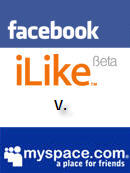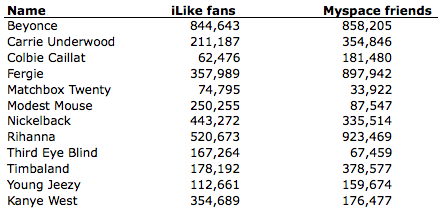 ILike, by far the most popular music application on Facebook, has started overtaking MySpace in sheer number of fans registered for some top music artists.
ILike, by far the most popular music application on Facebook, has started overtaking MySpace in sheer number of fans registered for some top music artists.
The young Seattle company is being coy on specifics, but consider this: Artists like Nickelback, Modest Mouse and Kayne West now have many more fans/friends on iLike than they do on the giant network MySpace. Name an artist, and there’s almost a 50-50 chance they’ll be more popular on iLike.
While iLike is nowhere near as popular as MySpace in traffic, the surge is significant because it shows how quickly Facebook’s platform — with its viral force among 40 million, mostly young people — can propel forward a young company like iLike. After all, iLike’s Facebook application only launched in May.
ILike currently has nearly eight million total users on Facebook, around ten percent of whom use the application daily.
VentureBeat randomly selected eleven musicians that have led the charts recently or are otherwise popular, noted their Myspace numbers, and got then requested the comparable data from iLike’s fan numbers. See below for a comparison chart, which iLike put together for us. You’ll see that in 5 of the 11 cases, iLike has more fans.
Many of these artists have had extensive Myspace-branded promotions within Myspace and on TV, in part aided by Myspace’s parent media conglomerate, News Corp; artists’ profiles on ILike’s Facebook site have not had the same benefits, Partovi notes.
Admittedly, this is a small data sample. However the types of artists that are more popular on iLike, versus MySpace, appear to align with what social researcher Danah Boyd wrote in a controversial essay from late June about socio-economic differences between Facebook and Myspace users. First, here’s what Boyd said:
The goodie two shoes, jocks, athletes, or other “good” kids are now going to Facebook. These kids tend to come from families who emphasize education and going to college… They are primarily white, but not exclusively. They are in honors classes..
MySpace is still home for Latino/Hispanic teens, immigrant teens, “burnouts,” “alternative kids,” “art fags,” punks, emos, goths, gangstas, queer kids, and other kids who didn’t play into the dominant high school popularity paradigm. These are kids whose parents didn’t go to college, who are expected to get a job when they finish high school. These are the teens who plan to go into the military immediately after schools. Teens who are really into music or in a band are also on MySpace. MySpace has most of the kids who are socially ostracized at school because they are geeks, freaks, or queers.
The mainstream rock bands on the list — Nickelback, Third Eye Blind, Matchbox Twenty and, for better or worse, Modest Mouse — tend to have fans that fit Boyd’s stereotype of Facebook users, and all have far more users on iLike.
Universally popular diva Beyonce is also equally popular between the two sites.
Hip hop stars Timbaland, Fergie, Rihanna are much bigger on Myspace. So is Colbie Caillat, the folkish singer who made it big through Myspace, and country singer Carrie Underwood.
Notably, though, rapper/producer Kanye West has a far larger following on Facebook; many critics and fans say his albums have become increasingly mainstream.
Gangster rapper Young Jeezy is the biggest anomaly, if Boyd’s stereotypes prove to fit overall — then again, mainstream rap mogul Jay-Z has signed Jeezy to his record label.
ILike, of course, would like to take every fan and musician from Myspace. By providing what for many Facebook users is their only music application, iLike is helping to make Facebook compete again Myspace music. At the same time, it is benefiting from Facebook’s overall growth versus Myspace.
“A month ago, if I told anybody we could unseat MySpace in music, they’d say I was crazy,” Partovi told us in May, only a few days after launching iLike’s Facebook application. “Today, it seems not only possible, but actually like it’s on track to happen unless we screw it up,” he said then. ILike has been the most popular music application on Facebook since it launched in late May.
Ilike’s closest competitor on Facebook, an application called Audio that let users upload and share entire tracks of songs, was removed by Facebook in July. Facebook said Audio was violating its terms of service, specifically, the parts of it concerning copyrighted materials. Audio keeps promising us that it will return, but has yet to relaunch.
Ilike’s user base is essentially a big address book of fans, complete with each users’ musical preferences, that musicians can tap into to promote concerts, album releases, and anything else.
Its Facebook application lets you choose audio clips of songs and put them on your Facebook profile, as well as buy songs through iTunes or Amazon. It separately offers a game where you can compete against friends to see who can name the most artists or songs from hearing snippets of tracks.
It also shows which of your favorite musicians are on tour, the locations of their shows, and which friends are planning to go.
ILike has additional means to beat its competitors. The company itself actually began as a music “discovery” service that used a downloadable plugin for iTunes to give you recommendations for songs you might like, based on what other users with similar tastes were also listening to. It still offers this service, and the company tells us it plans to integrate it with the Facebook application soon.
ILike also owns GarageBand.com, a site that features independent musicians.
Ticketmaster is an iLike investor, and provides iLike users information with about events where their favorite bands are playing, and then tries to sell them tickets.
VentureBeat's mission is to be a digital town square for technical decision-makers to gain knowledge about transformative enterprise technology and transact. Learn More

